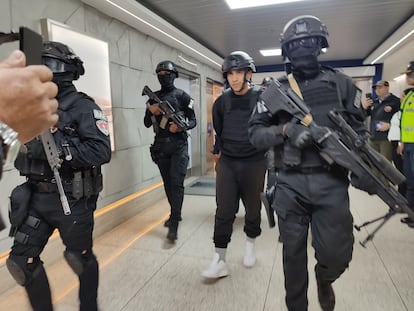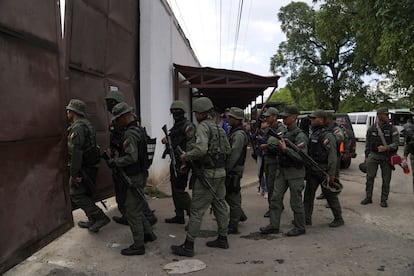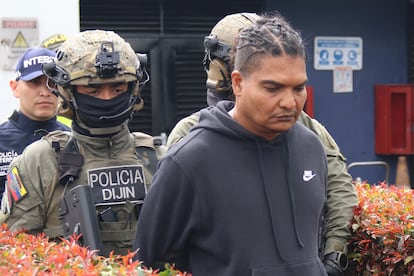The US and Colombia join forces against criminal mega-gang Tren de Aragua
Both countries declare war on the organization founded in Venezuela, and offer up to $12 million for three of its leaders. Spain has extradited Gerson Guerrero, brother of gang leader ‘Niño Guerrero’


The U.S. Embassy in Colombia and the Colombian Police on Thursday announced a reward program totaling up to $12 million for “information leading to the arrests and/or convictions in any country” of three leaders of the criminal organization Tren de Aragua, which was founded in Venezuela and has expanded throughout the region in recent years. “Criminals always look for a place to take shelter, and the Latin American police have international cooperation operations to capture the subjects wherever they are, but we still do not have information about whether these ringleaders are in Colombia,” said the director of the Colombian Police, General William Salamanca, during a press conference together with Francisco Palmieri, head of the U.S. Embassy to Colombia. Palmieri said that “the Tren de Aragua has become an organization that contributes to fear and confusion, and it is an obstacle for the Colombian and American population.”
The reward plan has been announced in the midst of negotiations between Venezuelan President Nicolás Maduro and Washington, just a few weeks before Venezuela is scheduled to hold elections.
The three leaders of the organization they are looking for are Giovanny San Vicente, aka Giovanny; Yohan José Romero, aka Johan Petrica, and Héctor Guerrero Flores, aka Niño Guerrero, for whom rewards of three, four and five million dollars are offered, respectively. Niño Guerrero escaped last year from Tocorón prison, in the central state of Aragua, from where he operated.
On Thursday, the White House announced “new actions to halt the spread of Tren de Aragua, a transnational criminal organization from Venezuela that is involved in violent criminal acts, and hold their members and associates to account.” Besides the rewards for information leading to the capture of its leaders, the Department of the Treasury designated Tren de Aragua as a significant transnational criminal organization. “As a result, all property and interests in property of Tren de Aragua that are in the United States or in the possession or control of U.S. persons are blocked,” said National Security Council Spokesperson Adrienne Watson. “Today’s designation of Tren de Aragua as a significant Transnational Criminal Organization underscores the escalating threat it poses to American communities,” said Under Secretary for Terrorism and Financial Intelligence Brian Nelson.
In addition to this new action by Colombia and the United States, Spain on Thursday extradited Gerson Guerrero, brother of the leader of the Tren de Aragua, as reported by the Venezuelan attorney general, Tarek William Saab. He had been arrested by Spain’s National Police last March in the city of Barcelona, and is accused of aggravated extortion, money laundering, criminal association, illicit trafficking of weapons and ammunition, terrorism and financing of terrorism. For these crimes he faces the maximum penalty back in his country, 30 years in prison. Saab assured that he will be prosecuted “relentlessly,” even though for the past decade his brother was able to establish a criminal empire from inside a Venezuelan prison.

The noose has tightened around the mega-gang, the largest in Venezuela and one of the most dangerous ones in the region. Last week the Colombian police arrested Larry Amaury Álvarez, aka Larry Changa, one of Niño Guerrero’s associates. Larry Changa is believed to landed in Chile in 2018, where he set up businesses and helped the organization expand. His capture has raised expectations that he may provide information leading to the capture of the other leaders. Recently, another member of the gang known as Salomón was also detained in Bogotá. “These arrests are added to the 79 that the police have carried out together with the Prosecutor’s Office,” said Salamanca.
The governments of the region have been trying for months to stop the advance of this gang dedicated mainly to extortion, micro drug trafficking and migrant smuggling, leading to a rise in crime in Chile, Colombia, Ecuador and Peru. Its presence has also been reported in Argentina and the United States, particularly in New York City. In the enormous Venezuelan diaspora, criminals found an opportunity to expand their illegal activities to other countries. But Venezuela considers that the gang has been dismantled, particularly after last September, when 11,000 law enforcement agents took over Tocorón prison, where Niño Guerrero operated from, although they never reported on the arrest of any of the ringleaders. The Venezuelan Prisons Observatory reported that the takeover was agreed upon with some of the inmates, and that some of them fled through tunnels and mountains surrounding the prison.

Some Venezuelan officials, including Foreign Minister Yván Gil, have even denied the gang’s existence and said that the revelations about its actions made public by police and journalistic investigations—such as those made by Venezuelan journalist Ronna Rísquez—are part of a smear campaign against Venezuela. These accusations led to strong diplomatic friction with Chile, one of the countries that has most vocally demanded active cooperation from Venezuela to put the Tren de Aragua criminals at bay.
The gang was organized between 2013 and 2015 in the state of Aragua, an industrial region of Venezuela. At first its members dedicated themselves to the extortion of merchants and neighbors, then they ventured into kidnapping and drug trafficking, and became a transnational organization. El Niño Guerrero served a 17-year sentence for drug trafficking and concealment of weapons of war, and kept controlling the businesses from prison. One line of business was charging between $8 and $10 a week from each of the more than 3,000 inmates to guarantee that they would remain alive inside the penitentiary center, a system implemented in many of the country’s prisons.
Sign up for our weekly newsletter to get more English-language news coverage from EL PAÍS USA Edition
Tu suscripción se está usando en otro dispositivo
¿Quieres añadir otro usuario a tu suscripción?
Si continúas leyendo en este dispositivo, no se podrá leer en el otro.
FlechaTu suscripción se está usando en otro dispositivo y solo puedes acceder a EL PAÍS desde un dispositivo a la vez.
Si quieres compartir tu cuenta, cambia tu suscripción a la modalidad Premium, así podrás añadir otro usuario. Cada uno accederá con su propia cuenta de email, lo que os permitirá personalizar vuestra experiencia en EL PAÍS.
¿Tienes una suscripción de empresa? Accede aquí para contratar más cuentas.
En el caso de no saber quién está usando tu cuenta, te recomendamos cambiar tu contraseña aquí.
Si decides continuar compartiendo tu cuenta, este mensaje se mostrará en tu dispositivo y en el de la otra persona que está usando tu cuenta de forma indefinida, afectando a tu experiencia de lectura. Puedes consultar aquí los términos y condiciones de la suscripción digital.








































